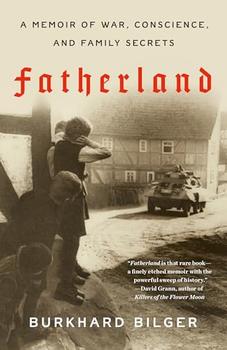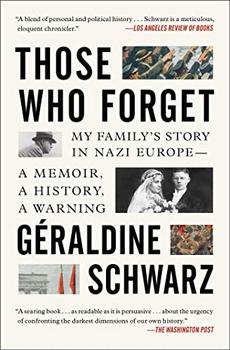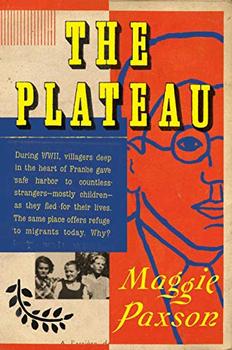Summary | Excerpt | Reading Guide | Reviews | Beyond the book | Read-Alikes | Genres & Themes | Author Bio

A Memoir of War, Conscience, and Family Secrets
by Burkhard BilgerBorn in Oklahoma to parents who immigrated from Germany in the 1960s, veteran journalist Bilger grew up eating Bratkartoffeln and Gurkensalat, immersed in German traditions, and speaking the southwestern German dialect of his parents' hometown in the Black Forest region. Outside the house, however, Bilger avoided talking about his heritage, sensing that his Germanness marked him as automatically suspect in the eyes of others, the specter of World War II always lurking. People would size him up warily, asking his parents' age and silently calculating back to 1939. More than one acquaintance confessed that it had taken them time to overcome their initial distrust, given his background. "To be German, it seemed, was always to be one part Nazi," Bilger writes, "In my case, that part was my grandfather."
Bilger was 28 when his mother first told him that her father, Karl Gönner, had been arrested and imprisoned as a war criminal in France in the aftermath of World War II. Beyond that, however, Bilger knew little about his maternal grandfather, a gaunt, stern man with a glass eye. Like most Germans of her generation, his mother rarely talked about the war or her father's role in it. Afraid of what he might find out, Bilger never dared to probe—until, one day, a package of yellowed, ink-smudged letters arrived in the mail from one of his aunts in Germany. Postmarked Bartenheim, the village in Alsace where Karl Gönner had been stationed during World War II, the letters contained tantalizing clues to his grandfather's story, and Bilger was drawn into investigating.
Fatherland recounts Bilger's search to understand his grandfather's role in the war, an almost decade-long quest that involved tracking down dusty archives hidden away in forgotten storerooms in France and Germany, decoding letters and documents penned in the indecipherable loops and swirls of old German script, and plumbing the memories of scores of interviewees, including some, now in their 80s and 90s, who had been students of his grandfather.
A schoolteacher and father of four when World War II started, Gönner was dispatched to Bartenheim to run the local school and teach classes, tasked with molding the children into loyal Germans. There he was promoted to the town's Nazi Party chief in 1942 and put in charge of enforcing Nazi rules—a role that, depending on the account, he took on either with fanatic fervor and exceptional cruelty or with ambivalence and fair-mindedness, attempting to shield villagers from the worst Nazi excesses.
Sifting through conflicting reports, Bilger scoured reams of archival evidence to piece together the truth about his grandfather's years in Bartenheim. Was Gönner a Nazi zealot and war criminal or merely a political functionary who was unfairly targeted by post-war recriminations? Had he imposed a reign of terror on Bartenheim, even instigating the murder of a local farmer who dared to resist, as alleged in his war crimes trial? Or had he in fact tried to use his position of power to help the town, as many residents attested?
Even as the details of his grandfather's story emerged more clearly, Bilger found it hard to achieve moral clarity. "The more I learned about my grandfather, the harder he was to categorize," he writes. Records showed that, during Gönner's years in Bartenheim, no one from the village was sent to a concentration camp. No families were deported. No political prisoners were executed. At his trial, 17 villagers testified in his defense, vouching for his innocence, and he was eventually exonerated. Yet throughout the war, Gönner had remained a loyal Nazi, never disavowing his role or his political party. Even if he was not guilty of the charges leveled against him, he had still been a passive accomplice to one of history's most barbarous regimes. How could an otherwise seemingly decent man—like so many ordinary Germans—have been complicit in something so evil?
Embedding Gönner's story into the larger context of the era, Fatherland traces his life from the rural village in the Black Forest where he grew up to the battlefields of northern France where he lost an eye in the First World War, and from Bartenheim in German-occupied Alsace to the hilltop fortress where he was imprisoned after the war. The result is both a deeply personal family portrait and an insightful and fascinating wartime history.
But while Fatherland is a work of history, it is also a book about the present, about history's effect on us today. What do we owe the past? How do we come to terms with our fraught family legacies? While Bilger wrestles with these questions in the context of his German ancestry, their relevance is far broader.
Hitler's Nuremberg Race Laws were inspired by the Jim Crow codes passed in the United States after the Civil War—still widely enforced when Bilger's parents arrived 17 years after the end of World War II. Oklahoma, where his family settled, is indelibly linked with the Trail of Tears, the brutal displacement of 16,000 Cherokee forced out of their ancestral lands in 1831. "Every country has its dark past," Bilger quotes his mother saying. The question is how to reckon with that past today. "What to do with our poisoned heritage? How to make peace with it without perpetuating its wrongs?"
![]() This review was originally published in The BookBrowse Review in May 2023, and has been updated for the
July 2024 edition.
Click here to go to this issue.
This review was originally published in The BookBrowse Review in May 2023, and has been updated for the
July 2024 edition.
Click here to go to this issue.

If you liked Fatherland, try these:

by Géraldine Schwarz
Published 2022
Those Who Forget, published to international awards and acclaim, is journalist Géraldine Schwarz's riveting account of her German and French grandparents' lives during World War II, an in-depth history of Europe's post-war reckoning with fascism, and an urgent appeal to remember as a defense against today's rise of far-right nationalism.

by Maggie Paxson
Published 2019
During World War II, French villagers offered safe harbor to countless strangers - mostly children - as they fled for their lives. The same place offers refuge to migrants today. Why?
Your guide toexceptional books
BookBrowse seeks out and recommends the best in contemporary fiction and nonfiction—books that not only engage and entertain but also deepen our understanding of ourselves and the world around us.